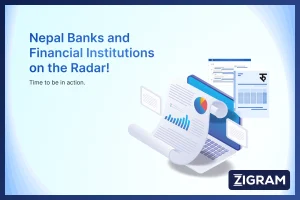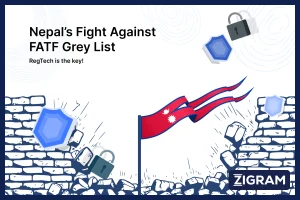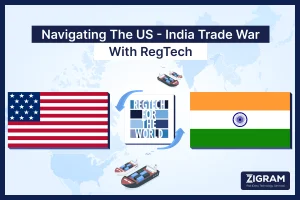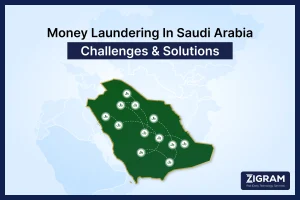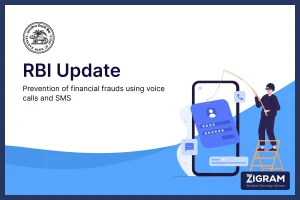In today’s world of compliance, the term “PEP” carries huge significance for various financial institutions. Identifying PEP, short for Politically Exposed Person, has become a crucial part of the financial sector to maintain its regulatory requirements and evaluate its risk management. Various countries, be it the UK, India, USA, EU, etc have implemented regulations for foreign and domestic PEPs to fight against money laundering. FATF guidance on PEP is the standard that countries follow to identify and evaluate risks from PEPs across the globe.
In this article, we will dive deep into the definition of PEP and expand our understanding and knowledge about it. We will also discuss how ZIGRAM provide solutions for organizations to manage risks and regulatory requirements for PEP and its identification on a global scale.

Defining PEPs
A Politically Exposed Person, in essence, refers to an individual entrusted with a significant public function, along with their immediate family members and close associates. These individuals, by their positions, carry an elevated risk of being involved in activities such as corruption, bribery, or other illicit transactions. It’s crucial to note that being designated a PEP does not inherently imply nefarious intent; rather, it signifies an increased potential for influence and access to substantial funds, warranting meticulous scrutiny under anti-money laundering (AML) and know your customer (KYC) regulations.
Requirements For Identification
Financial institutions and entities operating within the financial realm are mandated by regulators to identify PEPs among their clientele or those engaging in financial transactions. The process of identification entails rigorous screening against PEP databases, sanction lists, and a plethora of regulatory watchlists. However, the yardstick for identifying someone as a PEP might fluctuate across jurisdictions and institutions. Typically, PEPs fall into several key categories:
Foreign PEPs:
Individuals holding or having held prominent positions in foreign governments or international organizations.
Domestic PEPs:
Individuals with significant roles within their own country's government or political landscape.
Family Members And Close Associates:
Immediate family members and individuals closely associated with PEPs, as their potential involvement in financial matters can pose similar risks.
Types Of PEPs
1. Senior PEPs:
This category encompasses high-ranking government officials such as heads of state, ministers, and senior politicians
2. Financial PEPs:
Individuals occupying prominent roles within financial institutions or regulatory bodies.
3. Government Officials:
Those serving in various government agencies or departments.
4. Military Officials:
High-ranking military personnel, owing to their potential influence or access to significant funds.
5. Connected Business Persons:
Individuals involved in enterprises intricately linked to government contracts or funding.
Challenges And Significance
Identifying and monitoring PEPs pose substantial challenges for financial institutions. The inherent risks associated with these individuals necessitate meticulous due diligence, continuous monitoring, and robust compliance mechanisms. Failure to adequately identify and manage PEP relationships can lead to severe penalties, tarnished reputations, and heightened exposure to financial malfeasance.
ZIGRAM with the help of in-house research experts and data science team created a robust, well-structured and comprehensive PEP Database platform powered by AI, for institutions to keep track of PEPs in various countries. Its easy-to-use interface makes it one of the best tools to have for any organization’s risk management. Having Politically Exposed Person (PEP) databases from each country is immensely valuable for various reasons, contributing to enhanced financial integrity, regulatory compliance, and risk management. We cover 250+ jurisdictions and more than 2.4 million PEP Database constantly updated, maintained and scanned.
Here are some of the key usefulness of having PEP databases:
1. Risk Mitigation And Compliance:
Preventing Financial Crimes:
PEP databases serve as a critical tool in preventing financial crimes such as money laundering and corruption. By screening customers against these databases, financial institutions can identify and assess the risk associated with individuals holding prominent public positions or closely associated with them.
Regulatory Compliance:
Many jurisdictions mandate financial institutions to perform due diligence on PEPs as part of their anti-money laundering (AML) and know-your-customer (KYC) obligations. Access to comprehensive PEP databases ensures compliance with these regulations, avoiding legal consequences and reputational damage.
2. Enhanced Due Diligence:
Thorough Customer Assessment: PEP databases allow financial institutions to conduct more thorough and targeted due diligence on clients. This is particularly important when dealing with high-net-worth individuals or those involved in significant financial transactions, as their potential influence and access to funds warrant closer scrutiny.
3. Global Risk Assessment:
Cross-Border Financial Transactions:
In an interconnected global financial system, individuals with political exposure can engage in cross-border transactions. PEP databases from each country provide a comprehensive view of potential risks associated with international financial activities, aiding in global risk assessment.
4. Reputation Management:
Avoiding Unintentional Association:
Financial institutions strive to maintain a reputable image and avoid unintentional association with individuals involved in corrupt practices. Regularly updated PEP databases help in avoiding inadvertent relationships with politically exposed individuals, protecting the institution's reputation.
5. Preventing Illicit Influence:
Identifying Potential Influence:
PEP databases assist in identifying individuals who might use their political influence for illicit financial gains. This proactive approach helps in preventing situations where financial institutions may be manipulated for unlawful activities.
6. Government And International Cooperation:
Collaborative Efforts:
Access to PEP databases facilitates collaboration between governments and international regulatory bodies. Sharing information on politically exposed individuals enables a more effective and coordinated approach to combating financial crimes on a global scale.
7. Adapting To Dynamic Political Landscapes:
Timely Updates:
Political landscapes are dynamic, and individuals' political statuses can change rapidly. PEP databases that are regularly updated reflect these changes, ensuring that financial institutions have the most current information for their risk assessments.
8. Aiding Investigative Agencies:
Supporting Investigations:
PEP databases serve as valuable resources for investigative agencies probing financial crimes. These agencies can cross-reference their findings with PEP databases to trace the flow of funds and uncover potential connections to politically exposed individuals.
9. Customized Risk Profiles:
Tailored Risk Assessments:
PEP databases enable financial institutions to create customized risk profiles based on the specific roles and associations of politically exposed individuals. This nuanced approach enhances the accuracy of risk assessments.
PEPs stand as a pivotal focal point in the ongoing battle against money laundering and regulatory non-compliance. The identification, vigilant monitoring, and adept management of these individuals and their affiliations hold the key to mitigating the perils associated with financial impropriety. As regulatory landscapes evolve and concerted global efforts to combat illicit financial activities gain momentum, comprehending PEPs and implementing stringent compliance measures become increasingly indispensable for upholding the integrity of the financial sector.
ZIGRAM is the one-stop solution for all your compliance needs. Try our FREE DEMO to experience what you’re missing in your AML and KYC processes!
- #PEP
- #PoliticallyExposedPerson
- #DataAsset
- #PEPDatabase

